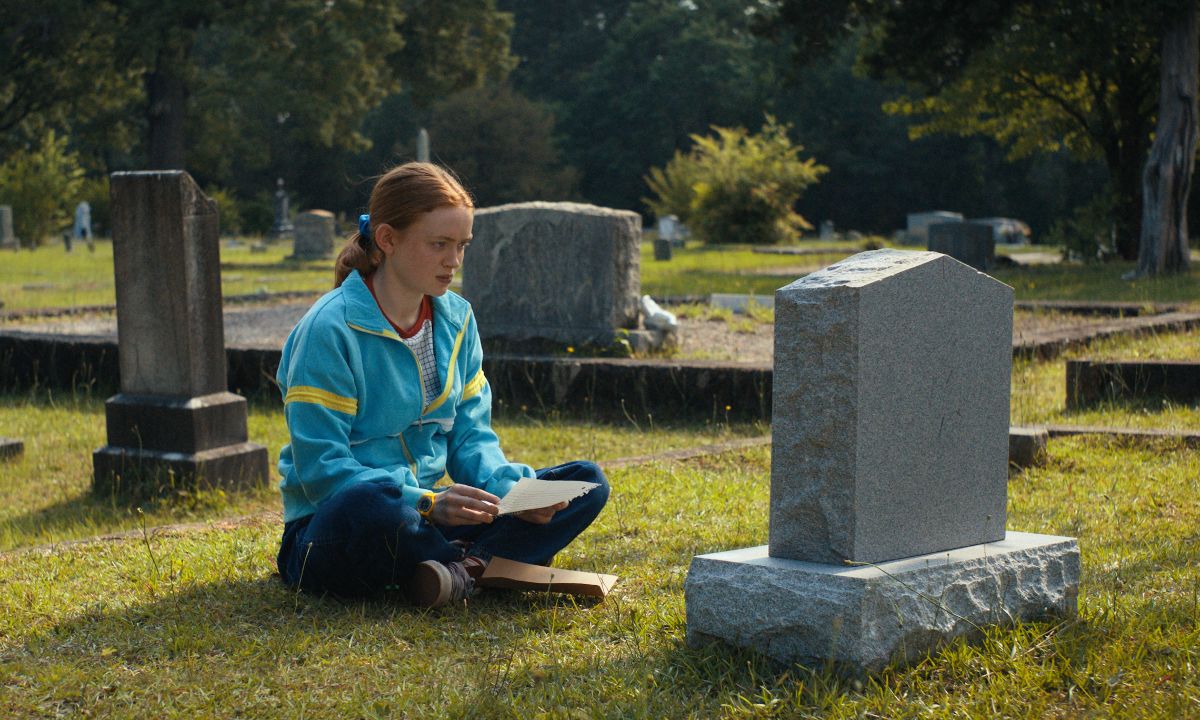The Depiction of Max’s Grief in ‘Stranger Things’ Is a Refreshing Outlier in the Genre

Often in horror, there’s not enough time to see the characters grieve. They experience devastating loss, but they’re not able to process it because their lives are still actively in danger. ‘Stranger Things’ season 4, however, took a different approach with Max (Sadie Sink). Max’s grieving after Billy’s (Dacre Montgomery) violent death in the previous season (something she witnessed) is really given time. And it’s refreshing—going through that kind of trauma changes a person, regardless of whether or not their relationship was rough, and it would be a disservice to the character if she wasn’t profoundly affected.
Spoilers ahead for Stranger Things season 4 volume 1.
Content warning: Discussion of suicide ideation and self-harm.
As soon as we see Max’s character again, she’s visibly different. Her charisma and sassiness aren’t as present. Instead, she’s sullen, withdrawn, and looks like she wants to be anywhere else. After a pep rally, Max is walking the walls with “Running Up That Hill” by Kate Bush blaring through her headphones, eventually leading her to the school counselor to talk about her home life—which has changed exponentially since Billy’s passing. Her asshole (did everyone forget he was abusive?) step-father left her mother—who now works two jobs. And Max is struggling.
As someone who has experienced loss this year, Max’s behavior isn’t annoying or uneasy for me to watch. Instead, it accurately portrays how grief is powerful in the worst possible ways. While everyone else is moving forward or seems to be coping better, you’re deeply struggling and in an immense amount of pain. Combine that with preexisting mental health issues, and it’s one big shitty pressure cooker that feels like it could explode at any moment.
A conversation that Max has with Lucas, who she broke up with at some point, is an example of people not fully understanding your grief:
Lucas: … Maybe you should find something you care about, too.
Max: What the hell is that supposed to mean?
Lucas: You’re just … It’s … It’s like you’re not even here anymore. It’s … It’s like you’re a ghost or something.
Max: A ghost? Really?
It’s important to show the contrast between Max and the other characters surrounding her. They want her to go back to the old Max and to express how she’s feeling, and she can’t do the former. That part of her died during the battle at Starcourt Mall. The only Max that exists is the one who has to process and work through her grief, and there’s power in depicting how, just like gaining something, losing someone changes us fundamentally.
Even though “Running Up That Hill” by Kate Bush isn’t about that type of grief (I’ve known the song for a long time and always thought of it that way), the lyrics speak to what’s going on inside Max. When the new Big Bad, Vecna (who poses as Billy), starts saying horrible things to her, he’s trying to break her down. But Vecna tells her that she secretly wants to follow Billy into death. It likely crossed her mind, something that’s not unusual when you lose someone. Grief can bring on suicidal ideation even if you’ve never experienced it before, and it’s refreshing to see a series like Stranger Things take the time to acknowledge this—in a way that can hopefully be helpful to its audience.
One of the most powerful scenes is Max, despite being in pain and grieving, fighting for life when Vecna is trying to claim her as a victim. Her friends make her listen to “Running Up That Hill” to help her break free. Then, moments of happiness flash through her mind, cementing this scene as one of the best in Stranger Things history. She gets away from Vecna and starts running for her life, while the song plays and everything is falling around her (much like certain stages of grief feel like). Her run towards life (the portal to gain her consciousness again) and fall from levitation is truly something else.
By the end of this episode, she’s embraced by her friends and repeats out loud that she’s still there, possibly an affirmation to herself and a middle finger to the part of her grief that makes her not want to be there anymore. There’s a power in understanding where you’re at in the grieving process, and maybe Max is headed towards a new stage.
For those looking for information, the Suicide Prevention Hotline site is a good resource.
National Suicide Prevention Lifeline (1-800-273-8255)
We can all help prevent suicide. The Lifeline provides 24/7, free and confidential support for people in distress, prevention and crisis resources for you or your loved ones, and best practices for professionals.
(featured image: Netflix)
Have a tip we should know? tips@themarysue.com